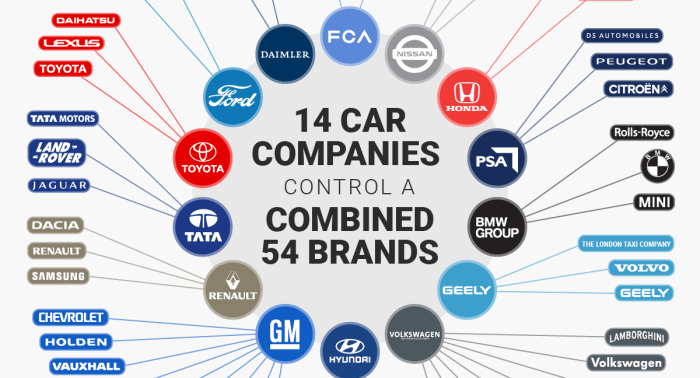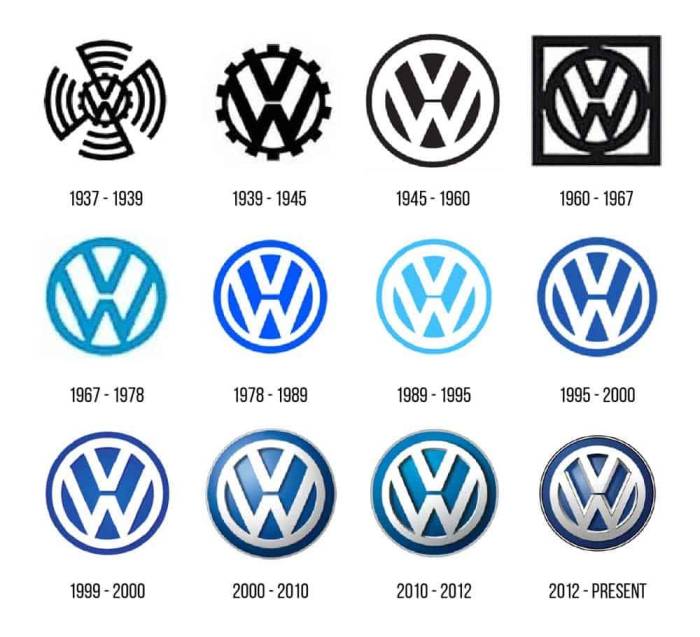What companies are part of volkswagen – Delve into the sprawling world of Volkswagen Group and discover the myriad companies that make up this automotive giant. From iconic brands to specialized subsidiaries, this comprehensive guide unveils the intricate web of entities that drive Volkswagen’s global success.
Volkswagen Group encompasses a vast portfolio of companies, each playing a vital role in the automotive landscape. Let’s explore the diverse businesses under the Volkswagen umbrella, their core activities, and the strategic significance they hold.
Subsidiaries of Volkswagen Group
Volkswagen Group, a global automotive giant, encompasses a vast network of subsidiaries spanning various industries. These subsidiaries play a crucial role in the group’s overall operations, contributing to its success and diverse product offerings.
The subsidiaries of Volkswagen Group can be broadly categorized into the following segments:
Automotive Brands
- Audi: A premium automobile manufacturer known for its luxury sedans, SUVs, and sports cars.
- Bentley: A British luxury car manufacturer specializing in handcrafted vehicles with a focus on opulence and performance.
- Bugatti: A French luxury sports car manufacturer producing exclusive and high-performance vehicles.
- Lamborghini: An Italian luxury sports car manufacturer renowned for its exotic designs and high-octane performance.
- Porsche: A German sports car manufacturer known for its iconic models like the 911 and the Cayenne.
- SEAT: A Spanish automobile manufacturer specializing in affordable and sporty vehicles.
- Škoda: A Czech automobile manufacturer known for its practical and value-oriented cars.
- Volkswagen: The core brand of the group, offering a wide range of vehicles from compact cars to SUVs.
Commercial Vehicles
- MAN: A German manufacturer of commercial vehicles, including trucks, buses, and special-purpose vehicles.
- Scania: A Swedish manufacturer of commercial vehicles, specializing in heavy trucks and buses.
- Volkswagen Commercial Vehicles: A division of Volkswagen Group dedicated to the production of commercial vehicles, such as the Transporter and the Amarok.
Financial Services
- Volkswagen Financial Services: A provider of financial services to Volkswagen Group customers, including financing, leasing, and insurance.
Other Subsidiaries
- Electrify America: A charging network company established by Volkswagen Group in the United States.
- Moia: A ride-hailing and mobility services provider.
Joint Ventures and Partnerships
Volkswagen Group actively collaborates with various companies through joint ventures and partnerships to expand its reach, leverage expertise, and access new markets. These collaborations bring strategic benefits, such as shared knowledge, reduced costs, and access to new technologies.
To understand what companies are part of Volkswagen, it’s helpful to know where Volkswagen comes from . The company started in Germany in 1937 and has since grown to include several brands, including Audi, Porsche, and Bentley. So, when you’re looking at what companies are part of Volkswagen, you’re looking at a global automotive giant with a rich history.
Joint Ventures
-
-*Shanghai Volkswagen Automotive (SVW)
A joint venture with SAIC Motor Corporation in China, established in 1984. SVW produces and sells Volkswagen and Skoda vehicles in China, one of the world’s largest automotive markets.
-
-*Volkswagen do Brasil Ltda.
A joint venture with Traton SE in Brazil, established in 1953. Volkswagen do Brasil produces and sells Volkswagen commercial vehicles, including trucks and buses, in Brazil and other South American countries.
-
-*Volkswagen Group Rus
A joint venture with GAZ Group in Russia, established in 2006. Volkswagen Group Rus produces and sells Volkswagen and Skoda vehicles in Russia.
Partnerships
-
-*Ford Motor Company
Volkswagen Group and Ford Motor Company have formed a strategic partnership to collaborate on the development and production of electric vehicles, autonomous driving technologies, and commercial vehicles.
-
-*Contemporary Amperex Technology Co. Limited (CATL)
Volkswagen Group has partnered with CATL, a leading Chinese battery manufacturer, to secure a long-term supply of battery cells for its electric vehicles.
-
-*Microsoft
Volkswagen Group has partnered with Microsoft to leverage cloud computing and artificial intelligence technologies to enhance its digital capabilities, including connected vehicles and autonomous driving systems.
Historical Acquisitions and Mergers
Volkswagen Group’s portfolio has been shaped by a series of significant acquisitions and mergers throughout its history. These strategic moves have allowed the company to expand its product offerings, enter new markets, and enhance its technological capabilities.
The following timeline provides an overview of some of the most notable acquisitions and mergers that have contributed to Volkswagen Group’s growth and expansion:
1964: Auto Union
Volkswagen Group acquired Auto Union, a German automaker known for its luxury and sports cars. This acquisition gave Volkswagen access to Auto Union’s advanced engineering and manufacturing capabilities, which were instrumental in the development of the iconic Audi Quattro.
1986: SEAT
Volkswagen Group acquired a majority stake in SEAT, a Spanish automaker. SEAT’s strong presence in the Spanish market and its expertise in small car production complemented Volkswagen’s existing portfolio.
Volkswagen is a global automotive giant with a vast portfolio of brands. Among its subsidiaries are Audi, SEAT, Škoda, and Bentley. The company’s reach extends far beyond its namesake brand, encompassing a wide range of automotive offerings. For a deeper dive into Volkswagen’s history and its acquisition of Was Auto Volkswagen , refer to the comprehensive article linked here.
Returning to the topic of Volkswagen’s subsidiaries, Porsche and Lamborghini also fall under its umbrella, further solidifying its position as a major player in the global automotive industry.
1991: Škoda
Volkswagen Group acquired a majority stake in Škoda, a Czech automaker. Škoda’s low-cost production capabilities and strong brand recognition in Eastern Europe made it a valuable addition to the Volkswagen Group.
1998: Rolls-Royce Motor Cars
Volkswagen Group acquired Rolls-Royce Motor Cars, a British luxury car manufacturer. This acquisition gave Volkswagen access to the ultra-luxury market and enhanced its brand portfolio.
2003: Bentley Motors
Volkswagen Group acquired Bentley Motors, a British luxury car manufacturer. Bentley’s strong brand heritage and focus on handcrafted luxury vehicles further expanded Volkswagen’s presence in the luxury market.
Volkswagen is a German automotive manufacturing giant that owns several renowned car brands. To understand how Volkswagen came to be, it’s worth exploring the fascinating story of its inception. The company’s origins can be traced back to the early 20th century, when it was founded with the mission of creating an affordable car for the masses.
Learn more about how Volkswagen started . Today, the Volkswagen Group encompasses a diverse range of brands, including Audi, Bentley, Lamborghini, Porsche, and Škoda, each with its own distinct identity and market positioning.
2009: Porsche
Volkswagen Group acquired a majority stake in Porsche, a German sports car manufacturer. Porsche’s iconic sports cars and advanced engineering capabilities complemented Volkswagen’s existing portfolio and enhanced its technological prowess.
2012: MAN
Volkswagen Group acquired MAN, a German manufacturer of commercial vehicles. This acquisition gave Volkswagen access to the heavy-duty truck and bus market, expanding its product offerings and strengthening its position in the commercial vehicle sector.
2022: Traton
Volkswagen Group acquired Traton, a Swedish manufacturer of commercial vehicles. This acquisition further expanded Volkswagen’s presence in the commercial vehicle market and strengthened its position as a leading global player in this sector.
Volkswagen is a massive conglomerate with many subsidiaries, including Audi, Bentley, Bugatti, Lamborghini, Porsche, and SEAT. Its popular SUV, the Tiguan, is manufactured in several locations worldwide, including Germany, China, and Mexico. To learn more about where your specific Tiguan was made, check out this informative article: where volkswagen tiguan made . It provides a detailed breakdown of the Tiguan’s production locations and other interesting facts about this beloved SUV.
Volkswagen’s extensive lineup of brands and manufacturing facilities showcases its global reach and commitment to providing vehicles for a wide range of consumers.
These acquisitions and mergers have played a significant role in Volkswagen Group’s growth and expansion. By acquiring companies with complementary strengths and expertise, Volkswagen has been able to diversify its product portfolio, enter new markets, and enhance its technological capabilities.
This has enabled the company to become one of the largest and most successful automakers in the world.
Global Presence and Operations: What Companies Are Part Of Volkswagen
Volkswagen Group has established a vast global presence through its manufacturing facilities, sales and distribution networks. The group operates in over 150 countries and regions worldwide, with a strong foothold in key markets across the globe.
The group’s manufacturing footprint is spread across Europe, Asia, North and South America, and Africa. Key production hubs include Germany, China, Mexico, Brazil, and the United States. Volkswagen Group also has a strong presence in emerging markets, such as India and Russia.
Volkswagen, one of the largest automakers in the world, has a diverse portfolio of brands under its umbrella. If you’re wondering whether Volkswagen still produces the iconic Beetle, check out have volkswagen stopped making beetles for the latest information. Returning to the topic of Volkswagen’s subsidiaries, the company owns brands like Audi, Porsche, Lamborghini, and Bentley, catering to a wide range of automotive enthusiasts.
Key Markets and Regions
Volkswagen Group has a particularly strong presence in Europe, where it holds a significant market share in Germany, the United Kingdom, France, and Spain. The group also has a strong foothold in China, the world’s largest automotive market, and is expanding its presence in North America.
Challenges and Opportunities, What companies are part of volkswagen
Volkswagen Group’s global operations present both challenges and opportunities. The group faces intense competition from other global automakers, as well as challenges related to economic downturns and fluctuations in currency exchange rates.
However, the group’s global presence also provides opportunities for growth and diversification. Volkswagen Group can leverage its scale and resources to enter new markets and expand its product offerings.
Brand Portfolio and Market Segmentation

Volkswagen Group boasts a diverse portfolio of automotive brands, each targeting specific market segments with unique value propositions. This strategy allows the group to cater to a wide range of customer needs and preferences, maximizing its market reach and competitive advantage.
The group’s brand portfolio can be broadly classified into three categories: core brands, premium brands, and commercial vehicle brands.
Core Brands
Volkswagen Group’s core brands, including Volkswagen, Škoda, and SEAT, are positioned as mass-market brands offering a balance of affordability, reliability, and practicality. They cater to a broad range of consumers seeking value for money and everyday functionality.
Premium Brands
The group’s premium brands, such as Audi, Porsche, and Bentley, are positioned as luxury brands offering high-performance vehicles, advanced technology, and exclusive experiences. They target affluent consumers seeking exclusivity, prestige, and driving pleasure.
Commercial Vehicle Brands
Volkswagen Group’s commercial vehicle brands, including Volkswagen Commercial Vehicles and MAN, are focused on providing solutions for businesses and professionals. They offer a range of vehicles tailored to specific industry needs, such as cargo transportation, construction, and passenger transport.
By leveraging its diverse brand portfolio, Volkswagen Group effectively caters to the diverse needs of customers across different market segments. This strategy allows the group to maintain a strong market position and maximize its revenue potential.
Outcome Summary

In conclusion, Volkswagen Group’s portfolio is a testament to its unwavering commitment to innovation, diversity, and global reach. Through its subsidiaries, joint ventures, and strategic partnerships, Volkswagen Group continues to shape the automotive industry, delivering cutting-edge technology, unparalleled driving experiences, and sustainable mobility solutions to customers worldwide.